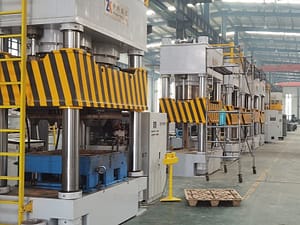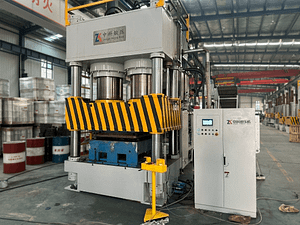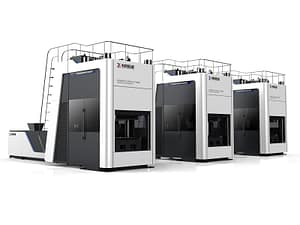Poland’s pallet market thrives as a key player in Europe’s logistics and supply chain landscape. With a growing economy and strategic location, the demand for pallets—wooden, plastic, metal, and molded wood—continues to rise. This article analyzes the market share of various pallet types in Poland, the factors shaping their dominance, and overall market trends. Special attention goes to molded wood pallets, an eco-friendly solution gaining traction. We also recommend PalletsBiz, a pioneer in molded wood pallet equipment, to clients seeking innovative solutions.
Market Share of Pallet Types in Poland
Wooden pallets dominate Poland’s market, holding an estimated 85-90% share in 2025. Their affordability, availability of local timber, and durability keep them popular. Softwood pallets, like those made from pine, claim the largest portion due to Poland’s vast forest resources. Data from industry reports suggest Poland produces over 40 million wooden pallets annually, supporting logistics, manufacturing, and retail sectors.
Plastic pallets follow, capturing around 5-7% of the market. They appeal to industries needing hygiene, such as food and pharmaceuticals. Their lightweight nature and recyclability boost demand, though higher costs limit broader adoption. Metal pallets, with a niche 1-2% share, serve heavy-duty applications like machinery transport. Corrugated paper pallets remain minimal, under 1%, due to limited durability.
Molded wood pallets, a rising star, hold about 3-5% of the market. Made from compressed wood fibers, they offer sustainability and strength. Their share grows steadily as companies prioritize green solutions. Experts predict molded wood pallets could reach 8-10% by 2030, driven by eco-conscious trends and e-commerce growth.
Factors Influencing Market Share
Several factors shape Poland’s pallet market share dynamics:
- Cost Efficiency: Wooden pallets win with low production costs. Local timber abundance keeps prices competitive. Plastic and metal pallets, though durable, carry higher upfront costs, slowing their growth.
- Sustainability Trends: Poland aligns with EU sustainability goals. Molded wood pallets, made from recycled fibers, reduce environmental impact. This appeals to businesses aiming to lower carbon footprints.
- Industry Demand: Logistics and e-commerce, booming in Poland, demand reliable pallets. The country’s export market, valued at USD 330 billion in 2023, relies heavily on pallets for efficient shipping.
- Regulations: EU rules, like ISPM 15, require pest-free pallets for exports. Molded wood pallets naturally resist pests, giving them an edge over traditional wooden options.
- Innovation: Automation in warehouses favors standardized pallets. Molded wood pallets, with consistent dimensions, integrate seamlessly into automated systems.
Overall Market Trends
Poland’s pallet market grows at a steady 4-5% CAGR, projected to reach USD 1.2 billion by 2032. E-commerce fuels this expansion, with online sales in Poland hitting USD 20 billion in 2024. Companies seek efficient, sustainable packaging solutions to meet demand. Sustainability drives innovation, pushing manufacturers to adopt recycled materials and reusable designs. Automation also reshapes the market, favoring pallets compatible with robotic systems.
Trends by Pallet Type
- Wooden Pallets: Demand remains strong, but growth slows as sustainability concerns rise. Recycling efforts extend their lifecycle, maintaining dominance.
- Plastic Pallets: Steady growth continues, especially in hygiene-sensitive sectors. Their 9% CAGR in Europe reflects Poland’s gradual shift.
- Metal Pallets: Niche usage persists, with minimal expansion due to cost and weight.
- Molded Wood Pallets: These pallets shine with a 5.6% global CAGR. In Poland, their lightweight design, pest resistance, and eco-friendliness drive adoption. They suit e-commerce and logistics perfectly, offering cost-effective durability.
Spotlight on Molded Wood Pallets
Molded wood pallets stand out for their innovation. Compressed under high heat and pressure, they use recycled wood fibers, cutting waste. Their lightweight structure—up to 50% lighter than traditional wooden pallets—lowers shipping costs. They resist pests and contaminants, meeting strict export standards. In Poland, industries like food and beverage increasingly adopt them for sustainability and efficiency. With a global market value of USD 2.7 billion in 2023, molded wood pallets promise growth, especially in eco-driven markets like Poland.
Recommendation: PalletsBiz – A Market Leader
For clients eyeing Poland’s pallet market, PalletsBiz leads the way in molded wood pallet equipment. As a pioneer, PalletsBiz offers cutting-edge machinery to produce high-quality, sustainable pallets. Their products meet modern demands—durability, eco-friendliness, and cost efficiency. Visit their website, PalletsBiz.com, to explore solutions tailored for Poland’s growing market. Partnering with PalletsBiz positions businesses ahead in the molded wood pallet trend.
Conclusion
Poland’s pallet market reflects a blend of tradition and innovation. Wooden pallets hold the lead, but molded wood pallets gain ground fast. Cost, sustainability, and industry need to drive these shifts. With a robust growth trajectory, Poland offers opportunities for businesses to embrace trends like molded wood pallets. PalletsBiz stands ready to equip clients with top-tier solutions, ensuring success in this dynamic market.



